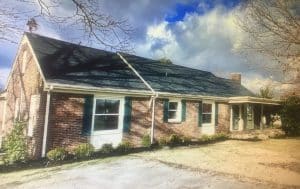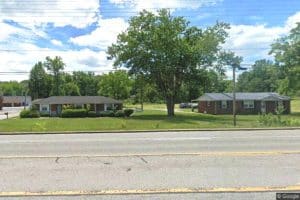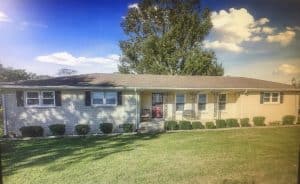March 1, 2023
By: Dwayne Page
The City of Smithville has been approved for a Community Development Block Grant through the Tennessee Department of Economic and Community Development in the amount of $433,790 to help fund a transitional housing program for at least eight females with or without children who are in recovery from substance abuse.
The Upper Cumberland Development District applied for the grant on behalf of the city last year and the program is to be administered by the Upper Cumberland Human Resource Agency. The grant is 100% funded with no local match requirement by the city.
During Tuesday night’s special city council meeting, UCDD and UCHRA Executive Director Mark Farley presented a proposed memorandum of understanding between the city and UCDD, which could be changed, but will have to be adopted before the project can move forward. No action was taken Tuesday night as the mayor and aldermen still have questions. More discussions are expected in upcoming workshops and meetings before any final decision.
Farley said the city does not have to act right away.
“This is not the final agreement. There may be things you (mayor and aldermen) want to add to it and that is fine,” said Farley. “We have some time. There is no rush to this. We need to take our time and make sure we get everything correct and that you are happy and we are happy,” said Farley.
Under the grant program, the UCDD and city would partner with UCHRA to manage the transitional housing facility in serving at least eight women in recovery who would be charged rent of perhaps $100 to $120 per month.
“Through this transitional housing program we work with individuals to get them into recovery and once they get out of recovery we try to place them into housing, put them in jobs, and make sure they have all the supports they need to be successful coming back into society,” said Farley
According to Farley, UCHRA would provide wraparound substance abuse programs to the residents of the home along with all the standard programs and services already offered by UCHRA in DeKalb County. Other groups may also get involved.
“We may also look for other partnerships such as the Fletcher Group, which serves several states in the southeast in providing technical assistance to organizations that are starting up transitional or substance abuse housing. Another partner could be the Oxford House, which is a group the state contracts with in providing some oversight. They have a model which could be established inside this home to help maintain the structure moving forward. We also have standard partners we already work very closely with including Volunteer Behavioral Health of Cookeville and the Emmanuel House in Carthage which we would use as a model to pattern this home after as we develop this program,” said Farley.
Three properties have been identified by UCDD as possible locations for the home including at 411 Juniper Lane, 805/809 West Broad Street, and 1309 South College Street. However, due to the age of the structures, Farley said they will all require testing for lead and other issues. The property selected would be purchased through the grant program. Although all these lots have potential for expansion of the project, Farley said UCDD would return to the city for approval before any expansion plans were ever undertaken.
“Two of the proposed locations we (UCDD) like better than the third but right now for this type of endeavor these are the three best properties out there. Probably the number one property in our mind looking at it is 411 Juniper Lane. It is for sale and setting empty and has been recently remodeled. There is an adjacent lot to it we would probably purchase along with that which makes for a good size to provide sufficient parking and open space. We would do some outside work, putting in a driveway and making parking improvements but for the most part that house is ready to go with visibility to Highway 70,” said Farley.
The site is further described in the proposed memorandum of understanding. “It has been recently remodeled and has bathrooms via hallways, and its within walking distance to stores, restaurants and is close to public housing, and could easily accommodate eight individuals or a mixture of females and children. It is currently zoned commercial”.
“The second property is at 805 & 809 West Broad Street near the Smithville Church of God with visibility to Highway 70. There are two houses on that property and a total of over five acres. It does have some issues in that its in the wetlands on the back side flood plain and those are probably the two oldest houses (of those being considered) and they need some improvement. It could be done but its probably not as good a project as the first one (Juniper Lane),” Farley continued.
“The third house is at 1309 South College Street. It is the next to last piece of property inside the city about as far south as you can go,” said Farley. “It is a decent sized lot at 1.64 acres with a separate outbuilding for storage. You could easily move into that home. We would probably do some additional remodeling. There is a carport that we would probably want to enclose,” he said.
Farley said the UCDD is open to considering other properties as well that may not as yet be on the market.
Although the city has been approved for $433,790 in grant funds, Farley said more money will need to be put into the project but not from the City of Smithville.
“For us to do what we need to do to get it (property) suitable, we are going to have to put more money into it. That $433,790 grant will go toward this project, but it won’t pay for 100% of it. Through the development district and our non-profit entity, Cumberland Regional Development Corporation (CRDC) we have the capability to put extra money into it because we believe it will repay in time so any money beyond the grant amount ($433,790) we are committed to putting that in there,” Farley continued.
UCDD proposes to subcontract the project with CRDC which already houses approximately 400 UCDD rental units across the region.
“We ask that you (city) transfer the project over through a subcontract and let us (UCDD) take it and then we would handle every bit of the acquisition. The city would still have veto power over any of these properties you don’t feel is suitable. It is your prerogative to say no. We would not do anything prior to your approval. After you confer it over to us CRDC would handle all the steps to acquire the property, make any renovations necessary, and assume all expenses of the property moving forward. The site would remain on the tax rolls for collection of property taxes and whatever else is due from that standpoint,” said Farley.
Mayor Josh Miller has named Aldermen Beth Chandler and Jessica Higgins, with the approval of the city council, to co-chair an oversight committee to be established by the city consisting of community members, faith-based leaders, and other stakeholders including recovery court representatives to work with the partnering agencies on how the program would be established and operated.
“I believe this transitional housing is going to be a great thing for moms and children. I toured the Emmanuel House in Carthage, which is similar to this project, and was very impressed with how well it seems to function. I know this is our first time with something like this but I’m confident we will get it right. This needs to be structured and well thought out before any votes are taken. Forming a committee, I believe is also the right move and I have confidence that Aldermen Chandler and Higgins will go a great job at heading that up,” added Mayor Miller.
“We believe we have developed a model that can handle at least eight people and make it financially work,” said Farley. “Between the rental income we also have some contracts with the state that administers services which would help recover costs of it as well. The contract will probably have terms that require that the house be a recovery home for at least seven years. If for some reason it became not viable and could not sustain itself within that time, we would probably liquidate the property and that money would either go back to the state department of economic and community development or back to the city. If at the end of seven years, we thought it would not be sustainable going forward, we would probably turn it into low-income rental housing like we operate already,” said Farley.






